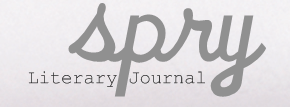On Monday, I had the pleasure of g-chatting with Erin Corriveau and Linsey Jayne, the founders of Spry, a brand new literary journal.
I know both Erin and Linsey from our MFA program, and I was intrigued by their mentions on Facebook and Twitter of a new literary magazine dedicated to brief literature.
As someone who naturally writes short, I really wanted to find out more, and so I asked them for an interview. After g-chatting with them for an hour, I’m excited about their project, which will showcase short, powerful pieces of writing, and I hope all the writers who read this blog will be as well.
Below is the interview, which is divided into three parts with page breaks. Click through, and enjoy!
Editor’s note: The following interview was conducted over the internet and has been edited. Lols have been removed, g-chat typos have been corrected, and for the sake of clarity, some sections of the interview have been moved around.
(Also, the ladies make reference to a “Third Semester Project.” That’s an academic project that Fairfield University makes its MFA students do in order to obtain their degree.)
What is Spry?
A J: So tell me about Spry. What distinguishes Spry from the other journals out there? What’s your vision for this publication?
J: So tell me about Spry. What distinguishes Spry from the other journals out there? What’s your vision for this publication?
Erin: Well, Linsey and I both studied “short” or “brief” literature during our third semester projects and we also really respect how well words are used when the space is limited. I’d say that what distinguishes Spry from other journals is the dedication we have to concise yet well-done writing.
AJ: So all the pieces in Spry are going to be super-brief?
Linsey: Yeah, we want to reward the bravery and power and experimentation that exists in shorter forms.
Erin: Ditto to LJ, that being said though….We’ve seen a lot of poetry that is concise to a fault (even though I wouldn’t really want to put it that way) I think we have a lot of poets sending us work that is quite sparse… While we don’t want epic poems, we also aren’t only searching for haikus.
AJ: That’s pretty cool. For short-form work, I’ve seen a lot of flash fiction journals, but not so many cross-genre journals dedicated to the short form. You’re accepting a few different genres, right?
Linsey: We sure are! We’re accepting submissions in creative nonfiction, short fiction, flash fiction and poetry.
Sorry. Flash anything, not just fiction.
Erin: Yes, and…. flash creative nonfiction too.
On Brevity:
AJ: This might seem like a silly question, but what’s the difference between flash and short fiction or non-fiction? Is there a word count cutoff? How does it work?
Erin: We had many discussions about this.
Technically Linsey is the expert here. I can say, though, that for our journal, fiction and creative nonfiction must be under 2500 words for the “normal genre” and then for the Flash category, all fiction and creative nonfiction must be under 750 words.
I don’t know if Linsey wants to speak more to how we came up with those numbers or anything, but I can say there was a lot of discussion…. and also a lot of forgetting what number we chose.
Linsey: I can if you’d like – in my Third Semester Project, I studied the superfine lines that exist between prose poetry and flash fiction (and flash fiction / short fiction), and while more often than not this is something that is dictated by the presentation of content, most publications seem to consider flash fiction as being around 750 words. Sometimes it’s a bit longer, no longer than 1,000 usually. So since our passions were driven by the shorter, more agile work of the economy of words, we stuck to the shorter end of that spectrum. And when I say flash fiction, again, I just mean flash prose.
Next section: Submitting to Spry, Issue One and Naming Spry

